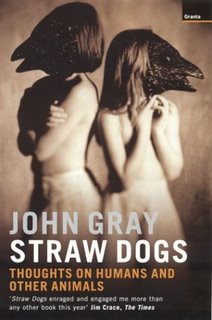 Books that Rocked my World (2): Straw Dogs: Thoughts on Humans and Other Animals by John Gray
Books that Rocked my World (2): Straw Dogs: Thoughts on Humans and Other Animals by John Gray
John Gray's Straw Dogs attempts to present a world view in which humans are not central and which argues against the humanist belief in progress. The heart of the book is summed up in the idea that modern humanists have still not come to terms with Darwin, still not come to terms with the idea that humans are like other animals. Christians and modern humanists in the Platonic-Cartesian tradition typically think of humans enjoying a special relationship to God, or a special status in nature in a way that other animals do not. Even the great debunkers--philosophers such as Nietzsche, Wittgenstein and Heidegger--end up making human beings the centre of things or the end point of some world-historical process. By contrast, in a Taoist, Shinto, Hindu or animist culture Darwin's discovery would have been easily accommodated since these faiths see humans and other animals as kin.
In short, for Gray, humanism is nothing more than "a secular religion thrown together from decaying scraps of Christian myth". Gray champions James Lovelock's view of the Earth as a self-regulating system whose behaviour resembles, in some ways, that of an organism. The Gaia hypothesis is the backdrop to Gray's apparently relentless pessimism about the fate of humankind. What it teaches us is that this self-regulating system has no need of humanity, does not exist for the sake of humanity, and will regulate itself in ignorance of humanity's fate.
I cannot recommend this book too highly. I actually picked it up because of its striking cover but then became intrigued by the idea – that humans are not a central feature in the world, that we’re just another animal. This book literally knocked me off my feet and made me see things in a whole new light. Needless to see I have since bought everything John Gray has written.

7 comments:
I love your "Books that Rocked my World" series. :)
I think people, including John Gray (from your description - I haven't read him) make the following error: because humans are animals (true) we're "just another animal" (false.)
Among other significant differences, I think the following three make us different enough that humanism is a valid philosophy:
1) Humans probably have the power to destroy all life on Earth.
2) We also have the potential to one day colonize other planets.
3) We have writing, which allows for exponential growth of understanding.
These differences don't mean that we are necessarily more "important" (whatever that means) than other animals, but it's silly to say that we aren't unique in important ways.
JA: Thanks for your kind comments.
I think what John Gray was getting at is that we're nothing 'special', that we shouldn't just assume a privaleged postion just because we have opposable thumbs and nuclear weapons. We are, in very many ways, just another animal.
You said that: Humans probably have the power to destroy all life on Earth.
Possibly - though I think we'd REALLY have to work at it. I think that there will be life on Earth LONG after we're gone.
You said that: We also have the potential to one day colonize other planets.
Oh, I do hope so. No time soon unfortunately. We'll also take other life forms with us too - both on purpose & by accident. It's quite possible that's how life moves between the stars - in developing intelligence for that very reason.. (though I'm seriously straying into metaphysics here)
You also said: We have writing, which allows for exponential growth of understanding.
I think this is the one thing that stands out as a substantial difference between us & other animals. We have writing - which allows for the passing on of information & the accumulation of same. Without it - knowledge would die with the people who discovered it - and humans would have precious little 'culture' or technology. We'd still be at the Stone Age level and we'd stay there pretty much forever - probably. But then again.. we're a pretty inventive species....
As to our 'importance'.. We're certainly full of our own self-importance and, to be quite honest, treat other animals like shit, but in the grand sceme of things (if there IS a grand scheme - [grin] - that is) are we really THAT important....? Good question.
When I was first exposed to Lovelock and the Gaia theory, I had no problem seeing humans as nothing special in comparison to other animals. For too many years I've viewed our species as a very persistent parasite on this planet.
V V said: For too many years I've viewed our species as a very persistent parasite on this planet.
I had no problem relating to the Gaia Hypothesis either. It made a lot of sense. Do you remember the Agent Smith speech from The Matrix when he tried to classify our species? The only conclusion he could come to was that we were a virus....
Sounds like a great book. I'll have to pick it up.
It's been a long time since I saw _The Matrix_, I do however remember being disturbed by the concept that all this could be a dream and that we're just matter to be used by another species. It's always disturbing to think we're not at the top of the food chain. But I think we need to think about that more often and put ourselves in the place of other creatures and this planet that we use and then throw away.
I thought that the whole Matrix idea was very interesting (though its been around for a LONG time).
Of course.... how would we ever know... unless we could 'wake up'..?
Very interesting philosophically...
Post a Comment